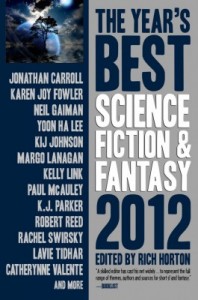 An Interview by Stacey Friedberg
An Interview by Stacey Friedberg
“Woman Leaves Room” by Robert Reed will be appearing in Prime’s forthcoming Year’s Best Science Fiction and Fantasy: 2012 edited by Rich Horton. Pre-order here!
What inspired you to write “Woman Leaves Room?” What was the process like?
Memory is suspect, but I did suffer the image of a woman leaving a room and then not returning for a great long while. I think I was watching TV. Maybe something on the screen triggered the image—a similar scene or whatnot. I don’t know and don’t care. I think up images all the time, and, like virtual particles, most of them vanish without notice. This one didn’t. Not long after, I made a file called “Woman Leaves Room” and set it aside. Not long after that, I found myself trying to write in the pre-dawn hours and faced several empty files, and on the spur of the moment, I decided to make the story about files being left alone and eventually lost. I wrote a few paragraphs and set it aside for a few weeks, which is typical, and then I went back to the file and finished it in a few days, without incident or much anguish. At least that’s what I remember, but again, memory is suspect.
Many of the characters in this story have been abandoned by their creators. In fact, the narrator spends most of this story being “lost,” with others unable to locate him or his origins. What do you think this says about humanity, that we let such important things slide away?
I don’t believe people let things slide away. It’s the nature of the universe that everything dissolves into oblivion and by every route possible, but human beings invest a lot of cleverness trying to cling to past events, real or imagined. And because we can’t succeed, we get angry and frustrated and feel guilty. Except the Buddhists, who say, “Fuck that,” and go on inside the moment.
If you could make a file copy of someone—anyone—from the past, present, or future, who would it be and why?
Winston Churchill’s mother, and in particular, while she was a young woman. And no, I’m not going to explain why.